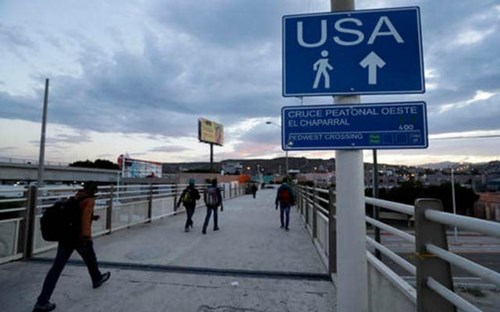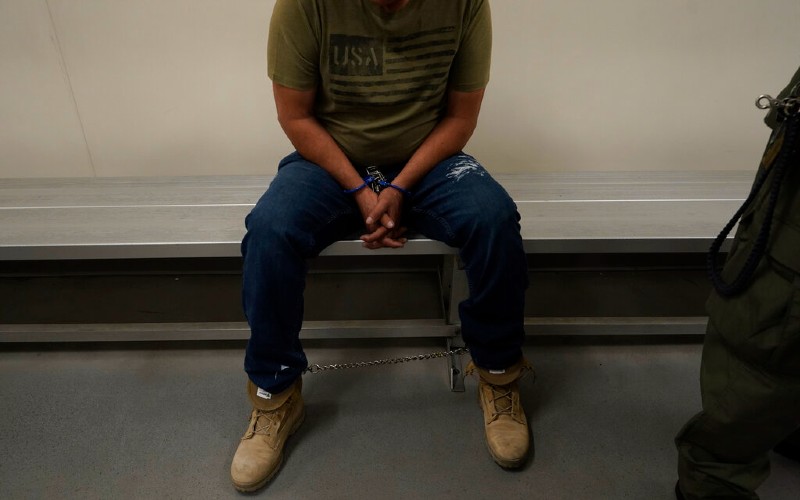President Joe Biden’s southern border polices reversed tough measures by President Trump, which the media noticed and applauded, but an open border has attracted numerous bad actors listed on the Department of Justice terror watch list, formally known as the Terrorist Screening Database.
At a Homeland Security Committee hearing last year, it was disclosed Border Patrol agents had encountered 286 illegal aliens from 2020 to 2023 who matched names on the terror watch list.
In a serious sign of continuous border troubles, eight Tajikistan nationals were arrested earlier this month.
The porous border is a terrorist’s dream but it’s not the only issue. Terror threats are multi-layered and increased in number and intensity soon after Hamas terrorists attacked Israel on Oct. 7 of last year.
 “There was already a heightened risk of violence in the United States before Oct. 7, and since then we've seen a rogues’ gallery of foreign terrorist organizations call for attacks against Americans and our allies," FBI Director Christopher Wray said before a Senate committee on June 4.
“There was already a heightened risk of violence in the United States before Oct. 7, and since then we've seen a rogues’ gallery of foreign terrorist organizations call for attacks against Americans and our allies," FBI Director Christopher Wray said before a Senate committee on June 4.
"Given those calls for action," Wray told senators, "our most immediate concern has been that individuals or small groups will draw twisted inspiration from the events in the Middle East to carry out attacks here at home."
“The director has also spoken quite frequently about the southern border and the increasing elevated threat of terror infiltration from there,” Todd Bensman, the national security fellow at the Center for Immigration Studies, said on Washington Watch Tuesday. “He’s quite right about that.”
Two weeks ago, Biden signed an executive order that didn’t eliminate illegal crossings but would begin to enforce an asylum ban on illegals once the numbers reached a seven-day average of 2,500.
Critics mocked the order as meaningless, with lots of loopholes, but NBC News called the measure “drastic.”
Biden on Tuesday announced his latest executive order which protects from deportation roughly 500,000 undocumented spouses of U.S. citizens who have been living in the country for at least 10 years.
That protection extends to roughly 50,000 stepchildren of U.S. citizens.
Congress has little recourse for Biden’s strategy of governing through executive order.
 “Every president has the ability to do that,” Rep. Ralph Norman (R-South Carolina) told Perkins. “The only thing good about executive order is it’s not permanent. It can be changed by the next administration, which it will be, but the damage that he's doing now from the day he took office three-and-a-half years ago … he’s opened up the gates.”
“Every president has the ability to do that,” Rep. Ralph Norman (R-South Carolina) told Perkins. “The only thing good about executive order is it’s not permanent. It can be changed by the next administration, which it will be, but the damage that he's doing now from the day he took office three-and-a-half years ago … he’s opened up the gates.”
Gates said Biden is feverishly working to make his polices as permanent as possible in an election year with the border a key topic.
“What he’s trying to do is put up barriers. Hopefully President Trump will win this election. He’s already said he’s going to have a massive deportation effort,” Norman said.
“It’s a program that’s geared to thwart the victory of Donald Trump in November,” Bensman said.
The Tajikistan Eight
Earlier this week, a House committee sought answers about eight Tajikistan nationals who had crossed the southern border and finally, months later, were arrested as part of a suspected terror plot.
Three major U.S. cities were involved in the FBI counterterrorism sting.
Homeland Security Committee chair Mark Green and others wrote Homeland Security Sec. Alejandro Mayorkas demanding information about how these individuals were handled at the border and whether they were watched after being released.
 Several among the eight crossed more than a year prior to their arrests earlier this month, The New York Post reported.
Several among the eight crossed more than a year prior to their arrests earlier this month, The New York Post reported.
“They were planning some sort of bombing attack,” Bensman said. “That would have been the very first time that a group of terrorists had crossed the southern border to access American targets on U.S. soil.”
How many such plots can U.S. authorities uncover after welcoming known terrorists or terror hopefuls into the country?
Recently, an Afghan national on the FBI’s terror watchlist spent almost a year inside the U.S. after being detained then released by Border Patrol agents in 2023.
Mohammad Kharwin, 48, was arrested in February but was released in March by an immigration judge who was not told that Kharwin is a national security threat. Kharwin remains free on bond awaiting an immigration hearing in Texas that is scheduled for 2025. There are no restrictions on his movements, NBC News reported.
Resurgent overseas threats
The Biden administration’s lax border policies have extended to foreign policy.
Terrorist organizations abroad, weakened during the Trump years, have regained solid footing, Bensman said.
“There are foreign terrorist organizations, like ISIS K in Afghanistan and Pakistan," he warned, "that have been able to take advantage of ungoverned territories in that area through the fact that the U.S. is not striking them as much. They’ve been able to grow.”

ISIS K – Islamic State Khorasan Province – is a regional branch of ISIS. ISIS K grew weaker during the Trump administration.
Other groups like Chechens, Tajikistanis and Muslim-majority regions of Russia are “on the rise” as potential troublemakers for the U.S., Bensman said.
“Their ideology is certainly not diminishing at all," he cautioned. "You can kill as many as you as you can, and that that's very helpful, but the ideology of global jihad and Islamist supremacy under Sharia law isn't going anywhere. It’s still quite an issue.”
It’s an issue made more difficult by Biden’s southern border policies.
“We did kind of a crackdown on airport traffic and people coming in on illegal visas after 9-11, but we haven’t done that much on the southern border for the last three years,” Bensman said.
We got pretty good at homeland protection
The U.S. hasn’t been immune to terrorism since 9-11, but no attack on the homeland has succeeded in such a large scale because U.S. administrations became intentional about combatting such attacks before the threats reached their peaks.
“We got pretty good at counterterrorism. We built up our FBI. We built up our federal law enforcement agencies. We started sharing intelligence between the agencies. The number of terror plots we’ve thwarted are far greater than the few successful ones. The threat is not diminished,” Bensman said.







